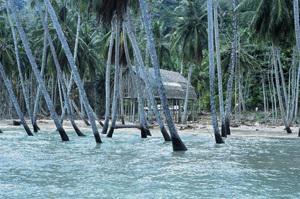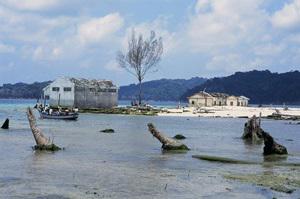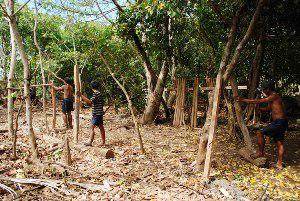Manish Chandi
Other projects
12 Mar 2012
Disturbance to Natural Resources, Sharing Mechanisms and Regulation: A Study of Natural Resources Management in the Nicobar Islands
This project proposes to document changes in resource use and management patterns by indigenous communities' post-tsunami, to enable inclusion of traditional management and conservation values into ongoing developmental programmes in the Nicobars. Though the experiential knowledge of the Nicobar Islanders has not been adequately documented, this project aims to understand systems of collective action amongst human communities in the use and regulation of natural resource harvests.

The Nicobar Islands are biologically unique with tropical forests, turtle nesting beaches, and extensive coral reefs. Indigenous islanders live primarily along the coast, and subsist largely on natural resources. Resources not accessed from the neighbouring ecosystems are accessed from regulated external markets. During previous work I described indigenous resource management mechanisms in the southern Nicobar Islands, practiced with seemingly sustainable and well-adapted conservation goals. These related to management of horticultural plantations for commerce, fishing and hunting grounds, kitchen gardens and forests. Such landscapes were typically co-managed with systems of ownership, and regulated use.

During my involvement with post-tsunami disaster relief and rehabilitation I was witness to well-intentioned efforts in rebuilding a shattered economy using paradigms of development often at odds with the indigenous culture of the Nicobars. There is a real danger of insidiously changing the way indigenous communities relate to and manage their natural resources. Until this event, the island communities of the Nicobar were relatively isolated from mainland markets, and use regimes were relatively benign. Developmental efforts in the wake of the tsunami are causing changes in these systems, both by modifying market demands for natural resources, as well as by creating financial dependencies through aid. These could have significant consequences for the way coral reefs, coastal forests, and other natural resources are managed and exploited. The increasing integration of indigenous communities into mainland markets could have serious and deleterious consequences for the high diversity environments of the Nicobars, if they are not understood and managed effectively. It is important to understand the impact that these developmental changes are having on the way local communities relate to and use natural resources. This study could help in evolving strategies of resource management that are both ecologically sustainable, equitable and locally appropriate.

I intend contrasting present day natural resource use and management with pre tsunami systems in the Nicobar Islands. I will map the distribution and abundance of major marine and coastal resources used by traditional communities in all ten inhabited islands, and document how these resources are owned/shared between communities. I will examine the influence of post-tsunami developmental efforts (Government and NGO), on these resource ownership and sharing regimes. In addition, I will explore the role of emerging markets in changing resource demands and supplies on the islands.